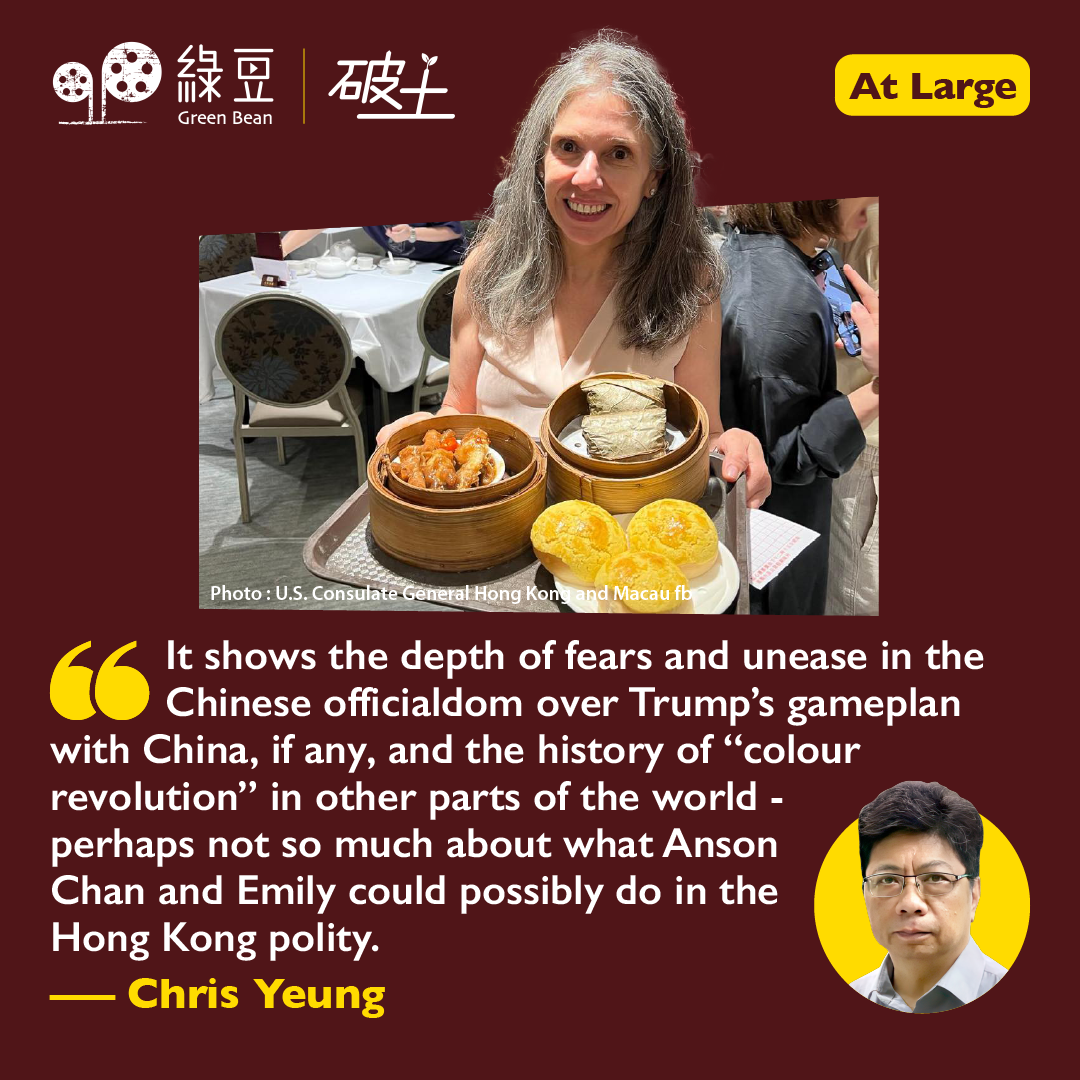US envoy warned not to cross four ‘red line’

Even before she took up the hot seat as the US consul general in Hong Kong, Julie Eadeh has been no stranger to controversy – no thanks to her alleged role in the 2019 social unrest. Seeking to stay clear of controversies in her new role, she has kept her head low and mouth sealed after taking office in late August. It was proved to be futile.
Branded as a “subversion specialist” by pro-Beijing media and politicians, Eadeh found herself at the centre of a rare diplomatic storm in the midst of a prolonged China-US trade war.
It may ease sooner or later, but looks certain to be just the first of its kind in Hong Kong-US relations, which are fraught with cross-currents and strong waves against the background of the volatile China-US ties.
Two receptions spark a Political Storm
On last Thursday (Oct 2), the Chinese Ministry of Foreign Affairs office in Hong Kong issued a statement saying commissioner Cui Jianchun had met with Eadeh on Tuesday.
Cui spelled out “four don’ts” for Eadeh. They are:
- Don’t meet the people the consul general shouldn’t meet with;
- Don’t collude with “anti-China forces”;
- Don’t be involved in “activities that undermine stability in Hong Kong”;
- Don’t interfere with national security cases in the city.
The warning, explicit and rare in recent memory, was given following a volley of bashings by Beijing-backed newspapers, both in editorial and opinion articles and in news reports quoting legislators, lawyers and community figures, against Eadeh.
She was fingered for meeting with former chief secretary Anson Chan and former Democratic Party chairwoman Emily Lau in two separate welcome receptions in September.
The receptions, hosted by her, were held in a low-key manner. They were not open to the media. There were no reports about the receptions both before and after they were held – until after they came to light in reports by pro-Beijing media.
A pro-Beijing media outlet revealed both Anson Chan and Emily Lau had attended the receptions separately without giving no further details, including whether Eadeh has given a speech and, if so, what she has said.
The consulate did not mention the receptions on its website. There was no picture of Chan and Eadeh taken at the reception. A picture of Emily Lau with Eadeh and another one with both together with two other guests, including a pro-government district council member, Eugene Chan, were found on social media.
Despite the dearth of substance, the presence of the pair, or more accurately, the invitations by Eadeh for them to the reception, is enough to precipitate a political storm.
Eadeh in 2019
Dozens of legislators, including heavyweight Regina Ip and Doreen Kong, a relatively moderate voice in the “all-patriots” legislature, condemned Eadeh’s invitations and their attendance.
Seen from the prism of conspiracy, their meetings were interpreted as a sign by them to start reconnecting to do something sinister. In an editorial after the meeting between Cui and Eadeh, a pro-Beijing newspaper wrote: “There are clearly hidden political purposes behind the appointment of Eadeh at this stage (of China-US relations).”
Noting the trial of Jimmy Lai has reached its final stage, it warned Eadeh and the forces behind her not to interfere with the courts and to seek the release of Lai.
Eadeh was head of the political affairs section of the US Consulate in 2019. She was branded as an “subversion specialist” for her alleged role in fomenting the political unrest in 2019.
Pictures that showed a meeting between Eadeh and several pan-democrats including student leaders Joshua Wong and Nathan Law at a hotel in Admiralty in 2019 had been seen as evidence of their collusion.
The depth of fears and unease
Obsessed with fears of “colour revolution”, her appointment has fuelled the conspiracy theory, giving a boost to advocates for war-time vigilance and hardball tactics against any potential threats to national security.
This is despite the fact that Anson Chan has kept silent and was almost invisible in public after she announced her retirement from political life shortly before the national security law took effect on July 1, 2020. The political influence of Emily Lau is also waning, like the Democratic Party she had chaired.
With no evidence showing the Hong Kong issue is high on the agenda of Trump and the disintegration of the pro-democracy force in the city, the idea of a revival of political activism led by democrats with the US behind is unimaginable. At 85, politics is the last thing Anson Chan wants.
It could not be more intriguing that a new US consul general seeking to connect with old and new friends has caused more than a stir because she has met two women whom Cui Jianchun is adamant she should not meet.
It shows the depth of fears and unease in the Chinese officialdom over Trump’s gameplan with China, if any, and the history of “colour revolution” in other parts of the world – perhaps not so much about what Anson Chan and Emily could possibly do in the Hong Kong polity.
▌ [At Large] About the Author
Chris Yeung is a veteran journalist, a founder and chief writer of the now-disbanded CitizenNews; he now runs a daily news commentary channel on Youtube. He had formerly worked with the South China Morning Post and the Hong Kong Economic Journal.